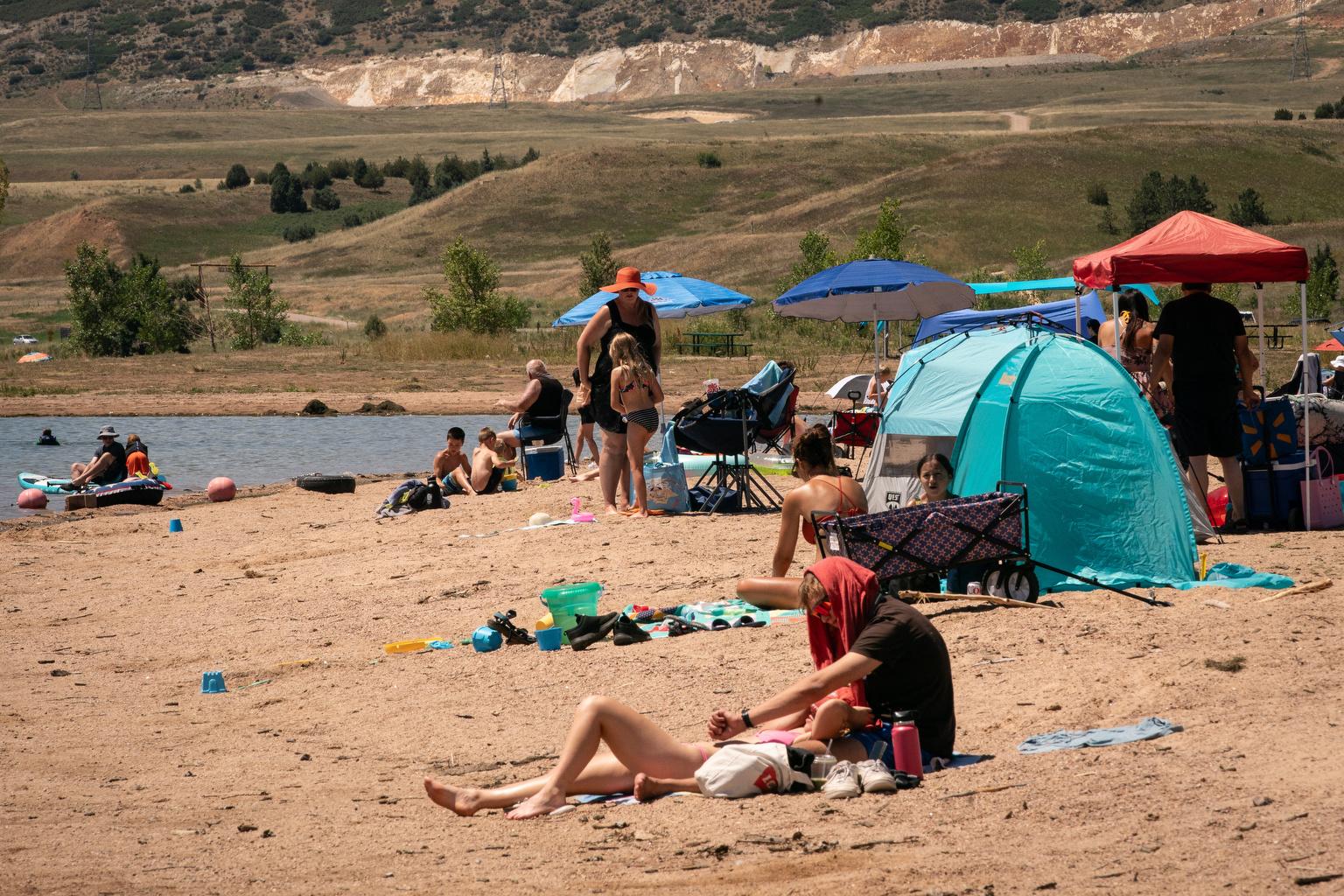
Heat kills more people than any other weather-related event in the United States, and with parts of Colorado expecting days of triple-digit weather heading into the weekend, doctors say understanding the risk is essential.
Days when the temperature hits 100 degrees or hotter are historically not that common in Colorado. If the forecast holds true, Denver will set three heat records this Friday, Saturday, and Sunday. Parts of the state are under a heat advisory through the weekend from 10 a.m. to 8 p.m.
“Heat is a great stressor to the human body,” said Dr. Jay Lemery, professor of Emergency Medicine at the University of Colorado School of Medicine. He is also the director of the climate and health program at CU.
“The first thing to do is to be aware that heat is a risk,” said Dr. Lemery. “And of course the times of the day to avoid the heat start in the late morning and go into the early evening.”
This interview has been edited for length and clarity.
Why does heat stress the human body?
“Heat is a great stressor to the human body and for those that are young and healthy, mounting a sweat response is how we cool off. It takes a lot of energy and it's something that otherwise people in good shape or that are healthy are able to do very efficiently. For those that are very sick or very old or physiologically vulnerable, the stress of heat can really throw them over the edge and push their bodies to work harder in ways that they're really not able to do, especially if they have comorbid disease such as heart disease, lung disease, or metabolic disease such as diabetes.”
“If you think about walking across a parking lot on a hot summer day, our pulses will go up 10, maybe 15, maybe even 20 beats, and that's because it's very hot. We begin to sweat, our bodies recognize the heat and they say, ‘Hey, it's time to cool down,’ and that's the sweat response. But when someone is on oxygen or a walker or on medicines that keep them from sweating as efficiently, that can throw them over the edge and exhaust them and put them into crisis, whether it's a heat-related disease, but more often it causes an exacerbation of their preexisting disease, such as chronic lung disease or coronary artery disease or diabetes.”
How are heat-related deaths tracked?
“So here's the tricky part: our attribution for heat illness is often not there because people will come in and they'll see me or my colleagues in the emergency department and they'll come in with shortness of breath or chest pain or high sugars, and that's what we put in the medical record. What we don't put in the medical record is that it’s the hottest day of the year. But we know that because there are some very good studies that during those extreme heat waves, the incidents of chronic disease spikes, exacerbations of chronic disease goes up. So we know heat is a force multiplier for disease, but we don't always have the attribution we need unless we do very sophisticated studies after the fact to be able to have that data.”
What is heat stress versus heat stroke?
“Heat stress is really meant to be a cascade of heat illness where we think of sunburns, we think of heat cramps, we think of heat exhaustion. Heat stroke is really the endpoint of a cascade of heat illness and heat stroke is really defined by organ failure. So whether it's your heart or your brain or your inability to cool off. So now your body temperature is rising to dangerous levels. It is truly a lethal disease that's at the end stage of this cascade of heat illness. So the time to pay attention to that is not at the heat stroke, but in the several hours beforehand when those symptoms are emerging from heat stress to the human body.”
What are the symptoms?
“Heat stress can be subtle and people often have to understand that heat stroke, passing out and organ failure is the very end stage of a cascade of heat illness. But the first stages are what you'd expect when you're confronted in extreme heat: heavy sweating, your pulse goes up, but then that can progress to fatigue, weakness, dizziness. Headaches are very common. That can progress further to nausea or vomiting or even feeling lightheaded. So all these things are signs that your body is under increasing amounts of stress, and that's where we say, get to a cool place, drink plenty of fluids and decrease your exercise or activity to allow your body to rest.”

How to reduce the risk for heat-related illness
“The first thing to do is to be aware that heat is a risk. And of course the times of the day to avoid the heat start in the late morning and go into the early evening. Those are times to not go grocery shopping, consider going for your walks or activities of daily living in cooler times of the day.”
“Being well-hydrated is critical to being able to sweat, and that's how our body's cool, but there's so much more than that. So it's important to be in a cool place. It's important to have access to good ventilation. So fans or air conditioning or air flowing helps our bodies cool off.”
What about outdoor activities this weekend?
“Colorado is the home of the active lifestyle. People love to be outside. It's the summer weekend, people have lots of plans. It is important to note that conditions will be extreme. And so even for high performance athletes, we have to keep this in mind that their bodies will be under much more stress than normal. And for those that aren't in tune with that, they could find themselves being unusually exhausted, having headache, nausea, vomiting because they're not drinking enough fluids because their heat exposures are so much more profound than normal.”
“Sports organizers need to pay attention to the heat index, which is a real composite measure of heat stress on the human body. Whether or not (games) need to be canceled really depends on the amount of time they're in the sun, what the activity is and the intensity of their activity. So all these things have to play a role. What I would say is that sports organizers and parents need to keep in mind that this is extremely hot weather, and so the normal processes in place to take breaks or water breaks and rests and get in the shade and so forth may need to be accelerated in these conditions, and they absolutely need to be paying attention to the athletes on the field and monitoring them for these early signs of heat, stress, nausea, vomiting, headache, weak weakness, fatigue, and things like that.”
Rethinking neighborhoods to create cooler communities
“Building community resilience is a key strategy. And so for instance, we know that green space is very important for communities to forestall what we call urban heat islands. Built environments covered with blacktop without green space in cities tend to be hotter and they tend to hold the heat longer, so at night they don't cool off as easy, and that is prolonged heat stress to a population. Lots of green space and park space keeps neighborhoods cooler and they get cooler at night. This is their urban heat island effect. So that's a very important strategy for cities to build resilience in the face of increased temperatures.”








